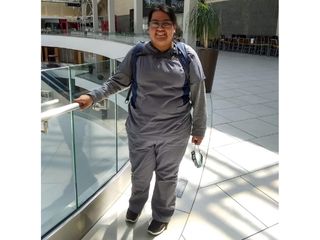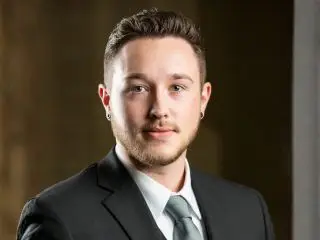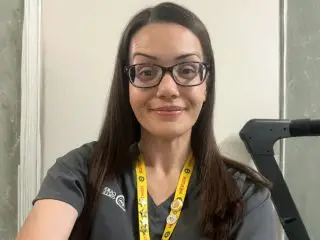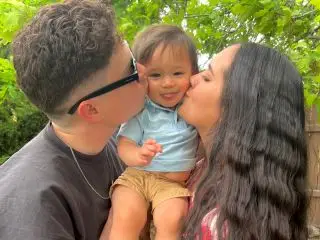 Stephany Martinez-Salazar is a big believer in big dreams. Just 20 years old, she has a clear vision of the future she intends to create for herself—and she’s already taking some essential first steps toward making it happen. “My goal is to study medicine at the University of Hong Kong and eventually become a cardiologist or heart surgeon,” says Stephany, who recently earned her Medical Assisting certificate at Carrington’s Portland, Oregon campus. “I know it’s going be a long, challenging road, but I’m getting a great start and I think I’ll be prepared for whatever comes.” We talked with Stephany about what attracted her to the Medical Assisting program, why she’s continuing her education at Carrington, and how being a patient many times throughout her childhood helped fuel her ambition to become a doctor.
Stephany Martinez-Salazar is a big believer in big dreams. Just 20 years old, she has a clear vision of the future she intends to create for herself—and she’s already taking some essential first steps toward making it happen. “My goal is to study medicine at the University of Hong Kong and eventually become a cardiologist or heart surgeon,” says Stephany, who recently earned her Medical Assisting certificate at Carrington’s Portland, Oregon campus. “I know it’s going be a long, challenging road, but I’m getting a great start and I think I’ll be prepared for whatever comes.” We talked with Stephany about what attracted her to the Medical Assisting program, why she’s continuing her education at Carrington, and how being a patient many times throughout her childhood helped fuel her ambition to become a doctor.
How did you first learn about Carrington’s Medical Assisting program?
It was a complete accident. I had enrolled in the Pharmacy Technology program at another school but there was a last-minute issue and I started looking for other options. I was researching surgical technology programs online, and I somehow ended up on the Carrington website. The Medical Assisting program interested me, so I called the school and explained my situation. Within two weeks, I was starting my program.
What was it about the Medical Assisting program that appealed to you?
It’s very straightforward and fast-paced. There were no unnecessary classes, and I was able to complete my program and earn my MA certificate in nine months. My favorite part of the program were the labs, because that’s where I developed skills that really helped prepare me for my new job.
What kind of jobs did you have before becoming a Medical Assistant?
I’ve done everything from work at a fruit stand to babysitting to volunteering as a teacher’s aide at my former elementary school. My father has a landscaping business, and since I was 13 I’ve helped him out any way I can—acting as an interpreter, handling billing and scheduling, and doing actual landscape work.
What is it about a career in medicine that interests you?
When I was younger, I wanted to be a teacher. But I eventually started thinking about a career in medicine because I spent so much time in doctor’s offices as a kid. I’ve had chronic headaches for years and doctors have never been able to determine a cause. I also have a speech impediment, and there was a time when doctors believed I might have autism. Having had so many experiences as a patient, both good and bad, I started to wonder what it would be like on the other side, actually providing the care rather than receiving it.
How do you think you’ve grown as a person during your time in the MA program?
I’ve learned how to become more comfortable interacting with people. I’m by nature a soft-spoken, shy person. I’ve gradually grown out of that to become more outgoing. I’ve learned to step out of my comfort zone and speak up. As a Medical Assistant, it’s important to be able to communicate with patients and health care providers effectively.
Were you nervous when you started your program?
I was so nervous at first! I live almost an hour from campus, so the first day I allowed plenty of time to drive there. I arrived a half-hour early and just sat there, wondering what it would be like and whether I would be able to do it. The program has six terms, with a new class beginning every six weeks. For some students, the first term might focus on Billing and Coding, and for the class starting after them, the first-class might focus on giving injections. Everyone completes every term, but not in the same order. As it worked out, my first term focused on injections. On the first day of my program, I was shaking because I didn’t even know how to hold a syringe. But the instructors were very thorough and so patient in teaching and guiding us. Before long, I started developing some self-confidence. It made the terms that followed feel a little less intimidating. Learning billing and coding or how to take a patient’s blood pressure seemed so much easier after giving—and getting—so many injections!
What was your externship like?
I had dreamed of working at Oregon Health & Science University for a long time. The night before my first day on my externship there, I couldn’t sleep. The entire first week felt like a dream come true. My nerves faded away pretty quickly because my Medical Assisting program provided a solid foundation. It always feels different when you’re out in the real world interacting with real people, but I felt prepared because I’d gained so much experience during my externship. I even had an opportunity to assist in caring for post-operative heart transplant patients.
How soon after you completed your program did you land a full-time job as a Medical Assistant?
Two weeks before my cardiology externship ended, OHSU offered me a full-time position at their hospital. I was so happy! I just completed my second week there. I’m currently doing a rotation that provides an opportunity for me to experience different departments and specialties. I’ve worked with cancer patients and also recently worked in pediatric cardiology. My youngest patient was six weeks old. As Medical Assistants, we often spend more time with a patient than their doctors or nurses do. I love getting to know our patients as people and doing whatever I can to help make their experience at the hospital the best it can be.
Tell me about your decision to continue your education at Carrington. What’s your goal?
I decided to earn my Associate of Science degree in Health Studies. I started in January and hope to be done by late summer. It’s an online program with six-week terms, and I’m currently taking two classes per term. Even though it’s very focused and structured, I have a lot of flexibility because I can organize my studies around my work schedule. Every week, new assignments are posted, so while I have to keep up, I can decide how to organize my time during the week. For people like me who have flexible or changing work schedules, that’s important—and necessary.
What would you say to someone who might be thinking about enrolling in Carrington’s Medical Assisting program?
If you’re committed and willing to do the work, it’s a great program. I learned a lot very quickly. It’s not easy, but it’s a short, focused program that will help you develop all the skills you need to successfully begin your career. For me, it was the perfect next step.



